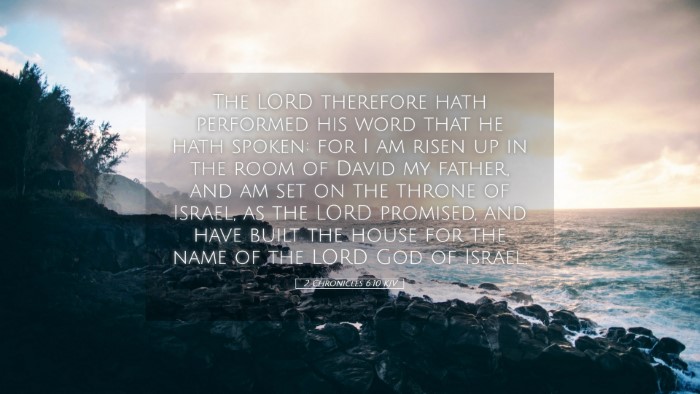Commentary on 2 Chronicles 6:10
Verse Context: This verse states, "The LORD therefore hath performed his word that he hath spoken: for I am come to be the king over Israel." In the historical account of 2 Chronicles, this statement reflects not only the fulfillment of God's promise but also the significance of Solomon's reign and the establishment of the temple as the center of worship.
Overview of the Commentary
This commentary synthesizes insights from public domain sources including Matthew Henry, Albert Barnes, and Adam Clarke. It considers the historical, theological, and practical significance of 2 Chronicles 6:10, aimed at enriching the understanding of pastors, students, and theologians.
Historical Significance
2 Chronicles expands upon earlier biblical accounts, specifically regarding the temple's construction and the importance of Solomon's kingship. According to Matthew Henry, this verse encapsulates a key moment where God’s promise is acknowledged in Solomon's reign. It implies that God is not only faithful to His word, but that He actively fulfills it through providential events.
God's Faithfulness
At the core of this verse is the theme of God’s faithfulness. Albert Barnes emphasizes that God’s commitment to His covenant and promise is fulfilled in a tangible manner through the help He extended to David and the success granted to Solomon. This divine faithfulness reassures the believer of God's reliability in all generations.
Theological Implications
This verse serves as an important theological marker within the narrative of Israel. Adam Clarke notes that it emphasizes the notion of God’s sovereignty in history. Solomon realizes that his kingship, which allows for the temple's construction, is a direct result of God's promise to David. This reflects an essential truth in theology: God orchestrates history according to His divine plans.
Fulfillment of God's Covenant
Further, this passage reinforces the concept of covenant theology. The establishment of Solomon as king and the completion of the temple are seen as milestones in God's ongoing relationship with His chosen people. Clarke highlights how the temple symbolizes God's presence among Israel, making it vital for understanding both God’s holiness and His desire for communion with humanity.
Practical Applications
The implications of 2 Chronicles 6:10 stretch beyond historical reflection. It encourages believers to recognize the presence of God in their lives as He fulfills His promises. Pastors can draw on this verse to inspire congregants to trust in God's timing and faithfulness, even amid trials when it seems like promises are delayed.
Trusting God's Promises
In practical ministry, the message of this verse can cultivate a spirit of anticipation. Barnes suggests that believers should embrace a heart attitude of expectancy, knowing that God will act on His words in their lives. This perspective fosters hope within the church community and promotes a deeper faith journey as they await the fruition of God’s promises.
Conclusion
2 Chronicles 6:10 ultimately serves as a reminder of God’s unchanging nature and faithfulness to His people. As expounded by the insights from Henry, Barnes, and Clarke, this passage incorporates historical fulfillment, theological depth, and practical encouragement. It remains vital for our understanding of God’s overarching narrative and a clarion call for faith in His promises.


